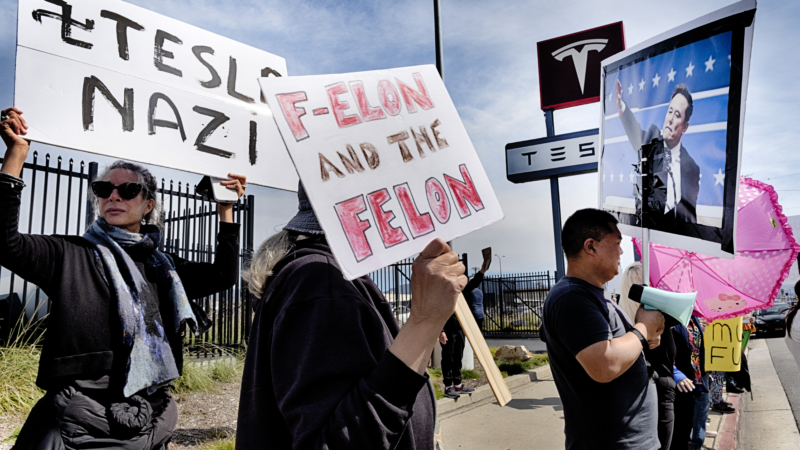Hundreds of anti-Musk protests are planned at Tesla locations worldwide this weekend
Tesla facilities worldwide have been the target of protests objecting to Tesla CEO Elon Musk’s influential role in the Trump administration. This weekend, organizers who have been leading peaceful protests in recent weeks are staging what they hope to be their biggest day yet.
As part of the “Tesla Takedown” campaign, hundreds of nonviolent demonstrations are planned to take place across the U.S. on Saturday. Organizers are calling it a “global day of action” with a goal of 500 protests worldwide.
For weeks, the movement’s organizers have been encouraging people to boycott the EV maker by selling their Tesla cars and stocks. According to Tesla Takedown, thousands of grassroots groups and individuals worldwide are driving the decentralized effort.
Tesla Takedown organizers say the movement is fueled by anger over Musk’s slashing of the federal government, and that it aims to hit the billionaire where it hurts — the electric vehicle company that’s become his main source of wealth.
Joel Lava, who has been helping lead Tesla Takedown protests in Los Angeles, says Musk’s work to dismantle government agencies and workforce through the unofficially named DOGE initiative is the primary motivator for the movement’s members.
“He’s spearheading DOGE, which is spearheading our country’s destruction — literally destroying our country’s infrastructure,” Lava said. “Therefore, we are taking direct aim at his power, which is his wealth, which is Tesla.”
Musk critics point to a litany of other grievances, including his attacks on diversity, a gesture he made on the Inauguration Day stage that was widely interpreted to be a Nazi salute, and his support for far-right parties.
Musk and the White House did not respond to NPR’s request for comment.
Since Musk’s political turn, Tesla sales have slumped, and investors have grown uneasy. But market analysts question how much the dip in Tesla sales and shares can be pinned on its CEO’s actions. Tesla has been losing market share to EV competitors for years. And the stock price has fallen in anticipation of auto tariffs. But Trump administration’s recently announced 25% import tariffs on cars made outside the U.S. could give the stock a welcome boost; auto industry analysts say that among domestic carmakers, Tesla will be the least impacted by the tariffs.
Some of the anti-Musk backlash has been violent. Tesla vehicles, dealerships and charging stations across the U.S. and in Europe have been the target of arson and vandalism. Some have taken to spray-painting swastikas on Tesla sedans and Cybertrucks.
Tesla Takedown movement, organizers say its participants are exercising their right to peacefully protest and that they oppose violence and property destruction.
But Musk did not make that distinction when he went after Valerie Costa, a community activist who has helped organize recent peaceful protests in the Seattle area as part of the Tesla Takedown demonstrations.
Musk, in a post on X earlier this month, accused Costa of “committing crimes,” without giving evidence or specific allegations. That was after he claimed that an environmental activist group she cofounded was backed by the ActBlue, a fundraising platform for Democrats.
Costa told NPR that the accusations were false, and that Musk supporters subsequently targeted her in direct messages that included threats of physical violence.
“When one of the most powerful, if not the most powerful person in the world is saying you’ve committed a crime, it doesn’t matter what the truth is,” Costa said.
Tesla Takedown organizers who say they want to chip away at Musk’s power, and that starts with tarnishing Tesla’s brand.
“Trump only likes [Musk] because he’s rich,” Lava, the LA-based organizer, said. “If suddenly Musk becomes just another boring, low-end billionaire, Trump will dump him too, and that will also show the power we have as people to effect change.”
Guides to help you tackle your New Year’s resolutions
From building your strength to tackling credit card debt, NPR's Life Kit has a newsletter journey to help you tackle your New Year's resolution.
Guides to help you tackle your New Year’s resolutions
From building your strength to tackling credit card debt, NPR's Life Kit has a newsletter journey to help you tackle your New Year's resolution.
Dozens presumed dead in fire at Swiss Alps bar during New Year’s celebration
Dozens of people are presumed dead and about 100 injured, most of them seriously, following a fire at a Swiss Alps bar during a New Year's celebration, police said Thursday.
Crypto soared in 2025 — and then crashed. Now what?
For most of 2025, cryptocurrencies such as bitcoin surged as President Trump vowed to make the U.S. a crypto leader. But now, a severe sell-off has shaken the sector.
Warren Buffett officially retires as Berkshire Hathway’s CEO
The legendary 95-year-old investor spent decades building his company into one of the world's largest and most powerful. Now Greg Abel is taking it over.
Zohran Mamdani sworn in as New York City mayor, capping historic rise
Mayor Zohran Mamdani took the oath of office in New York City after midnight Thursday. The city's first Muslim mayor, a member of the Democratic Socialists of America, has promised to focus on affordability and fairness.






